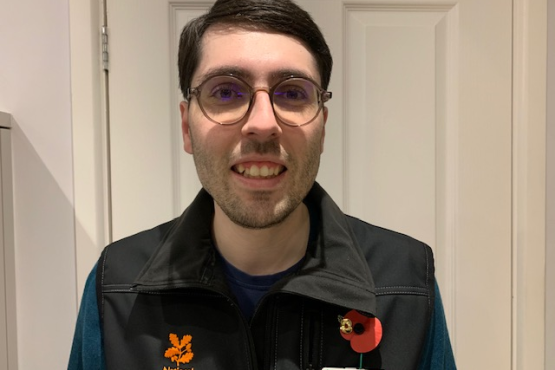How the National Trust is helping to level the playing field for disabled people

Matthew Brunt, a Collections Assistant here at the National Trust, has been part of Charlecote Park’s Collections team since May 2022. As someone with a neurodiverse condition, Matthew is passionate about raising awareness for those with disabilities, and how organisations can help level the playing field for such individuals and be truly equitable in the way they operate. Here, he explains how the National Trust supported him throughout the interview process, and beyond.
I have been part of the National Trust since May, working as a Collections Assistant at Charlecote Park.
When I first submitted my application for the role, I made sure to disclose that I have a condition called Asperger's Syndrome – which falls under the wider umbrella term of Autism – from the outset.
Despite negative experiences of doing so in the past with other organisations, I always feel it is important to be upfront and honest about my condition. Nobody should ever be made to feel as though they can’t.
How the National Trust made me feel seen, heard, and respected
After being successfully shortlisted for an interview, the hiring manager at the Trust was very considerate in asking if I required any reasonable adjustments for the upcoming process.
Part of my condition means I sometimes struggle to process information, so they kindly provided me with a copy of the questions I would be asked on the day of the interview itself, which was really useful.
Though it was a relatively simple adjustment to make, it really helped me feel more at ease throughout what can often be a very stress-inducing situation.
In return, I made sure an information sheet on Asperger's syndrome was made available for the hiring manager and each of the interviewers. That way, they could gain a better understanding of my condition and the reasonable adjustments that would be required if I were hired.
Once I received an offer for the role, the hiring manager explained she would like to have an informal chat – alongside a resourcing specialist – to discuss my reasonable adjustments.
I really appreciated the opportunity to be accompanied by an advocate from Thrive into Work, a service supporting individuals with registered disabilities as they try to find work. It was a level of engagement I had never experienced throughout my entire working life up to that point.
For me, it was a clear demonstration of the Trust’s proactive nature and willingness to discuss important topics like disability in the workplace, and an acknowledgement that they – like many organisations – have a legal responsibility to implement reasonable adjustments for those who require them.
Such adjustments don’t just serve to put my mind at ease or help me through potentially challenging situations. They also, crucially, help to create a more level playing field for me alongside neurotypical colleagues.
For example, adjustments such as noise-cancelling ear buds and noise cancelling earphones are a necessity due to the hypersensitivity I have with sound – a common trait of my condition.
In a noisy environment such as the one I now work in – which, to many of my neurotypical colleagues, may seem relatively quiet – these adjustments go a long way to enabling me to fully focus on my work.
Another reasonable adjustment the Trust has made specifically for me is a provision that allows me to take a five-minute break whenever I become overwhelmed by events.
With these sorts of provisions, I’m able to remove myself from potentially stressful situations and find a quiet, safe space in which I’m able to then calm down before returning to work.
Why you shouldn’t feel afraid to disclose your disability
Throughout my first few months working at Charlecote Park, the National Trust have been incredibly supportive, firstly through the agreed funding received through Access to Work, and also in providing me with any supportive equipment and extra support I need for my role.
My hiring manager has made sure my work schedule can be adjusted as and when needed, so that I can always find time to attend any necessary appointments outside of work.
If, like me, you have a neuro-diverse condition, I can confidently say that the National Trust will support you in any way they can.
There is no reason for you to be afraid of disclosing your disability – at any stage of your application.
Though doing so can be understandably nerve-wracking, disclosing your disability or neurodiversity is hugely beneficial in the long-term.
It enables your interviewers, and prospective colleagues and managers to gain a deeper understanding of you at the earlier possible stage.
But it also provides them with an opportunity to really understand your condition, and all the subsequent support and adjustments you will need to succeed in your new role.
Categories
- Apprenticeships (52)
- Building Surveying (3)
- Business Services (1)
- Catering (1)
- Communications and Marketing (3)
- Conservation (9)
- Countryside (10)
- Curatorship (3)
- Diversity (1)
- Estate Management (4)
- Finance (2)
- Food and Beverage (6)
- Fundraising (8)
- Gardening (11)
- General Management (2)
- Governance (2)
- Heritage Building Crafts (4)
- Holidays (3)
- House and Collections (4)
- IT (8)
- Membership (1)
- People and Legal (3)
- Projects and Programmes (6)
- Retail (2)
- This is us (5)
- Visitor Experience (3)
- Volunteer and Community (3)
- Volunteering (1)
- Work Experience (1)
- Young People (12)
You might also be interested in


